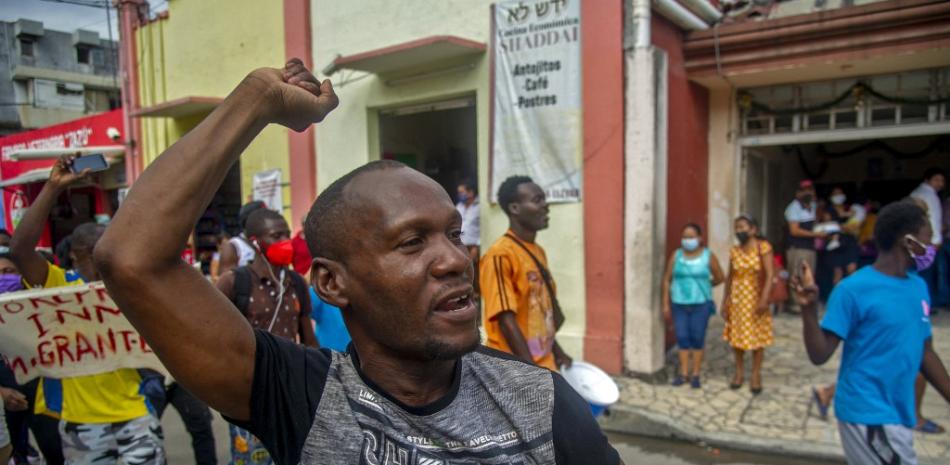Haitian migrants reel off their misery in the hard journey to the US
Natalia CANO
Tapachula, Mexico | AFP
Thousands of kilometers of road, whole days through mountains and jungles, assaults, shipwrecks. On their way to the United States, fleeing poverty, Haitian migrants unravel a tragedy.
Many embark on the adventure encouraged by family and friends who reached the goal, but who
speak little of the misfortunes that await them , such as being trapped in
Tapachula.
This city in southern Mexico became a funnel where tens of thousands of Haitians and Central Americans desperately seek a permit - which does not arrive - to advance towards the desired north and not be deported to Guatemala.
Tired of waiting and with the little money they carry, some continue their march undocumented, but at the border with the United States they are trapped again.
Thousands who cross the Rio Grande now crowd under a bridge that connects Ciudad Acuña (Mexico) and Del Río (Texas) to seek refuge in the United States. The hardships, aggravated by the covid-19 pandemic, do not stop.
- Stations of the Cross of ten countries -
Every night Murat "Dodo" Tilus is awakened by the excruciating pain in his arm caused by a fall on a Colombian mountain, during the journey to meet his brother in Miami. On August 8, he, his wife, a daughter and two grandchildren left Chile. A month later, after crossing through ten countries, they arrived in Tapachula. They had emigrated to Chile in 2017, taking advantage of the opening of that country after the 2010 earthquake that left 200,000 dead in Haiti.
"My house fell down, my family died, then I made an initiative with my wife to go to another country," Tilus, a 49-year-old electrician, told AFP.
But the "Chilean dream" began to fade in 2018 when the government imposed measures restricting migration.
In Chile now "it is very difficult to get the card (work permit), everything became more expensive, so people want to go out to seek a better life," he says.
Between him and his wife Rose Marie they raised about $ 5,000 to get to Tapachula.
They left Arica by bus and now share a room in a humble home, where four other Haitian families live. The city of 350,000 people is collapsed.
If it weren't for his brother's remittances, Tilus and his family would be on the streets, like other migrants.
Within four walls, the Tilus await the appointment they were given to process their refugee claim in December.
The Comar - entity that attends these requests - is overwhelmed. This year it has managed about 77,559 permits, exceeding the 70,400 for all of 2019.
Hundreds of migrants tried to advance in caravans this month, but were repressed by Mexican authorities. "I want to follow (the United States) legally," says Tilus hopefully. - "I did not want to leave" -
Like her cousin "Dodo", Judith Joseph is also looking to settle in the United States. He fled to Chile in 2017, after one of his three children was killed.
With difficulty walking, this 43-year-old diabetic and hypertensive woman left on July 10 and just arrived in Tapachula on September 6 along with her minor children.
The family says that they lived one of their worst moments in the Darien Gap, a jungle area between Colombia and Panama, where criminal groups operate and some colleagues drowned trying to cross a river.
"When we passed the jungle (...), where the mountain of Panama was, we crossed the river and people died there. It was very strong," recalls 11-year-old Samuel. Others were stripped of their few belongings.
The boy recalls his life in Haiti as something equally "difficult", with his mother working in a market.
"When I was with my grandmother, there were mice in the kitchen at night; when it was daytime there were always Haitian soldiers shooting outside the house," he says.
Judith is assisted by Samuel and Cristelle, eight, who help her walk and communicate in Spanish.
They live crammed with other people in a precarious room on the outskirts of Tapachula. With money they receive from relatives in the United States, they will pay the $ 75 rent, until they achieve refugee status and thus continue to the United States.
Unlike Central Americans, with a long history of undocumented migration, many Haitians present in this city seem to advance blindly.
My mother "lied to me and didn't tell me we were coming to Mexico, I didn't want to leave, I wanted to stay in Chile," Samuel laments.
Miles de kilómetros de carretera, días enteros por montañas y selvas, asaltos, naufragios. En su camino a Estados Unido

listindiario.com







